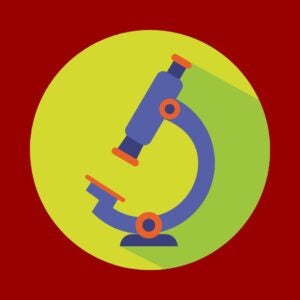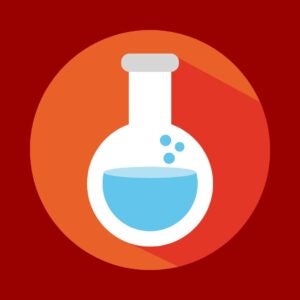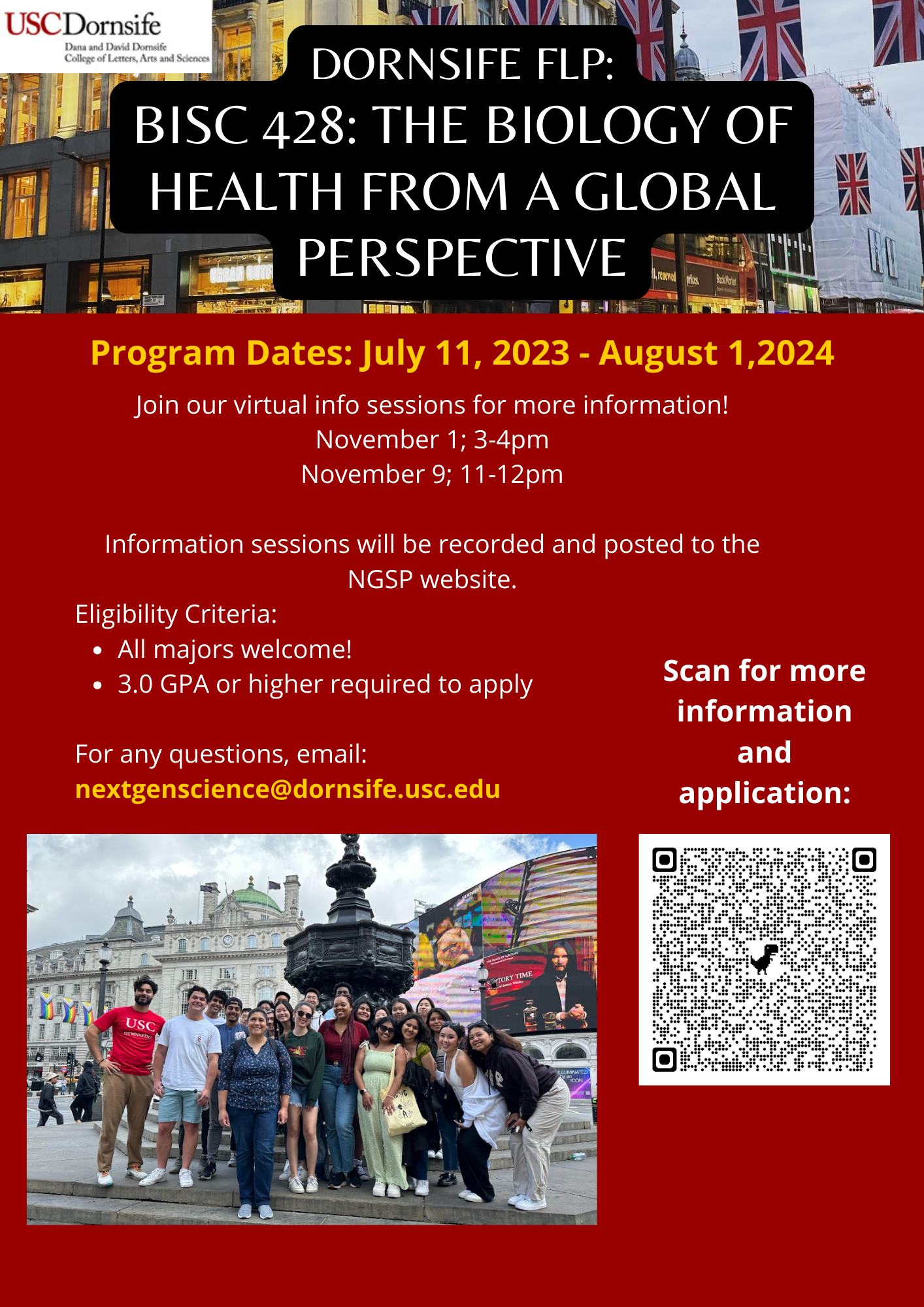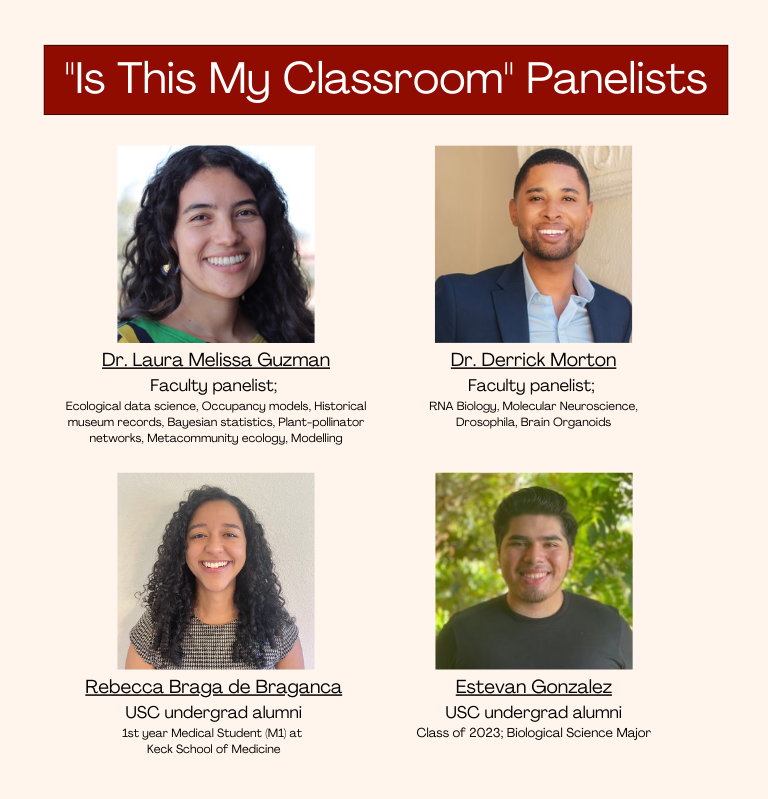Next Generation Science Programs
The USC Dornsife Next Generation Science Programs features resources, programs, and events to support and engage students in the Natural Sciences. Check out our upcoming events, research and internship opportunity postings, and learn more about our academic support services.
Our Mission

 USC Dornsife’s Next Generation Science Program aims to increase engagement, participation, equity, and inclusion in the natural sciences at USC. We strive to provide access to academic support and immersive experiential opportunities that further encourage students of all backgrounds to fully engage and thrive in the USC science community.
USC Dornsife’s Next Generation Science Program aims to increase engagement, participation, equity, and inclusion in the natural sciences at USC. We strive to provide access to academic support and immersive experiential opportunities that further encourage students of all backgrounds to fully engage and thrive in the USC science community.
Upcoming Events
See below for upcoming events hosted by Next Generation Science Programs:

Past Events
See below for recordings of past events hosted by Next Generation Science Program:
2023-2024
- New Student Welcome
- It’s Always Midterm Season: Study Strategies for Maximizing Your Performance on Exams in STEM NTS Presentation
- BISC 428 Information Session Recording
2022-2023
- Academia vs Industry recording
- Fall 2022 BISC 428 Info Session Recording
- Exploring Paths in the Biological Sciences Powerpoint

Is This My Classroom?
On April 4, USC Dornsife Next Generation Science Programs hosted “Is this my Classroom?”, a program centering the experiences of STEM students and faculty from historically marginalized ethnic backgrounds. As a person of color in a STEM classroom, the lack of shared backgrounds with peers and professors can pose a challenge to many undergraduate students. This can cause students to question whether they belong in a STEM academic space, which may ultimately drive them to move away from their desired professional careers. The goal of the program was to broaden undergraduate students’ perspectives through the experiences of a panel composed of two professors, a USC alumni and current Keck medical student, and a graduating pre-med senior, all of whom identify as Black and/or Latinx. Through this panel, we aimed to inspire future Black and Latinx STEM professionals to remain on their current path and validate their experiences in spaces where they are the minority.
The panelists were asked a series questions centered on their personal experiences in traversing the STEM undergraduate space as students of color, their experiences currently as professionals, and possible solutions that could benefit undergraduate students today.
Describe your own experiences and background while traversing the undergraduate STEM space and classrooms. This can include how you felt while in these spaces and the way in which you were able to overcome the obstacle. Was there a key moment or moments in which you could say that you were almost “taken out” from your space in academia?
Dr. Guzman provided context on her undergraduate experience, stating that her upbringing in Colombia with English as a second language made her experience especially unique. She found it difficult to prepare for and take the GRE for graduate school and felt her graduate school options were limited based on her language barrier.
Dr. Morton explained that, as a Black student in STEM courses, he felt isolated and struggled to find study groups. Growing up in Kentucky, Dr. Morton reflected on his experiences as the only Black student in his STEM courses. Dr. Morton shared anecdotes about his struggles in his first chemistry class where he was unable to find individuals to study with him. It was only after having received an A on the first exam that peers began to reach out. Dr. Morton remembered the initial feeling of rejection that later shifted to clarity. He reflected, “Oh, now I understand. They just thought I wasn’t going to be helpful in this study group.” Despite these experiences, Dr. Morton was able to build connections with his peers, despite their differences, and still appreciated his undergraduate experience. His undergraduate experiences actually led him to apply to a historically Black college for graduate study, against the advice of many people who said that it wouldn’t prepare me for a competitive career and postdoctoral experience. I still decided to go.
Rebecca had difficulty earning grades in STEM courses at USC that would make her competitive for medical school, almost causing her to give up on her goal of a career in medicine. In the early years of her undergraduate career, she had to work two jobs along with being involved in extracurricular and leadership positions on campus. She reflected on how little time she had to study and commented, “and that was not an experience that other people in my class were having. So, for them, it might have been easier for them to actually get that grade because they had that extra time. I didn’t have that time.” Rebecca found that giving herself grace allowed her to move on and thrive in her undergraduate career.
Estevan questioned his belonging in a STEM space due to coming to USC from an underfunded high school and underperforming in introductory courses. He reflected on his struggles in introductory biology as a freshman and his overall feeling of not belonging. Estevan recounted a time where he looked up the ranking and college readiness index of his former high school, finding both metrics shockingly low. This information only made Estevan feel more out of place in such a rigorous STEM environment. Later, as he began to connect with more of his Latinx peers he realized, “maybe I’m not the only one that’s struggling. And that was the case, I found a lot of friends that were like Latino, etc. And we, we sort of bonded initially in those courses. And it was probably the reason that I didn’t drop then and there.” Finding a sense of community was a turning point for Estevan’s STEM experience at USC.
Are your experiences any different now that you have entered spaces as professionals or pursued advanced degrees? What has changed? What is similar?
Dr. Guzman found a sense of community in graduate school and was able to help other students have access to scientific resources in Spanish. She also shared an experience where a journal reviewer commented that they should have an English speaker review their paper, assuming that because they did not have English-sounding names, they were not native English speakers.
Dr. Morton’s choice to attend an HBCU for graduate studies was rooted in his desire to build community with other Black students and faculty, despite being advised against it. Dr. Morton recounted the concerns of advisors and peers alike and shared, “The bigger point that they were trying to make is that I did extremely well in undergrad and they wanted me to go to a well-resourced school and [they] felt like an HBCU would not prepare me for the career I wanted, or I wouldn’t fulfill the potential of being a scientist.” Dr. Morton describes the experience at his HBCU as positive and he found the opportunity to build community like he had not done before. Despite external concerns and assumptions, his research was still well-funded and he had many opportunities to publish his research and make an impact in his field. His transition to Emory university for post-doctoral training was rewarding, but his identity as a Black scientist was still salient in some of his experiences.
Unlike her hometown in South Florida and upbringing in the suburbs of Chicago, Rebecca was amazed by the number of Latino peers at USC. Rebecca reflected, “I remember when I was applying to medical school there were schools that only had 10 people of color, it was insane.” Rebecca also described the privileges of her peers as she points out the lack of concern for finances and those who come from households where their parents are physicians. These experiences differing from the “bubble” Rebecca had experienced while at USC.
Looking to the future, Estevan believes that in his pursuit of becoming a physician the likelihood this feeling of being the “other” in academic and professional spaces will remain the same. However, he feels that it is important he continues his journey to pave a path for those coming after him. Estevan declaring, “I want people from where I’m from, or people from Los Angeles, who grew up in similar impoverished neighborhoods, who aren’t as well versed in speaking in a professional manner, or anything of that nature to really fill those spaces, because they belong in those spaces.”
Moving forward, what do you believe are some measures that institutions could implement to better serve URM undergraduates as they progress through their journey in STEM? What would you have liked to see done while you were an undergraduate that can serve undergraduates of the future?
Dr. Guzman, based on her personal experiences in academia, advocated against making identity-based comments within institutions. Dr. Guzman emphasized the need for proper training and sensitivity surrounding topics that addresses issues of identity.
Dr. Morton agreed that additional training is necessary, particularly for the older generation. He recounted instances where some professors failed to recognize the importance of diversity, making statements such as “we should be doing everything based on merit.” Dr. Morton countered this viewpoint by pointing out that merit itself is subjective. He also discusses the measures he is implementing as a professor, such as fostering a less formal interaction between professors and students.
Rebecca suggested actions that undergraduates from minoritized ethnic backgrounds can take to create a sense of community. She stressed the importance of intentionally seeking out a community, as college can be challenging and overwhelming at times.
Estevan believes that the STEM departments at USC should make a more concerted effort to help students find their community. He proposed the creation of a link on the official blackboard page of STEM courses, where underrepresented minority students can form study groups based on self-identification. Estevan also advocated for increasing the representation of Black and/or Latino faculty and students to better reflect the local community. He shared his own experience of feeling intimidated when encountering professors from different backgrounds and suggests involving students in the hiring process to improve the chances of finding relatable professors.
